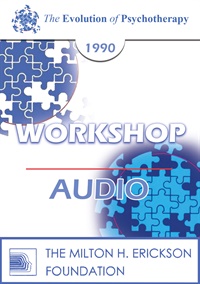
- Average Rating:
- Not yet rated
- Topic Areas:
- Workshops | Anger | Anxiety | Cognitive Behavior Therapy (CBT) | Depression | Psychotherapy
- Categories:
- Evolution of Psychotherapy | Evolution of Psychotherapy 1990
- Faculty:
- Donald Meichenbaum, PhD
- Duration:
- 2 Hours 2 Minutes
- Format:
- Audio Only
- Original Program Date:
- Dec 15, 1990
- Short Description:
- The focus will be on the cognitive-behavioral treatment of affective disorders (anxiety, depression, and anger). Such procedures as cognitive restructuring, problem-solving, and stress inoculation training will be examined.
- Price:
- $15.00 - Base Price
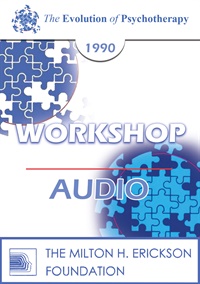
- Average Rating:
- Not yet rated
- Topic Areas:
- Workshops | Family Therapy | Psychotherapy | Transference / Countertransference
- Categories:
- Evolution of Psychotherapy | Evolution of Psychotherapy 1990
- Faculty:
- Carl Whitaker, MD
- Duration:
- 2 Hours 52 Minutes
- Format:
- Audio Only
- Original Program Date:
- Dec 15, 1990
- Short Description:
- A multigenerational approach using co-therapy can enhance the effectiveness of family therapy. Cross-generational feedback avoids imprisonment in traditional transference. Family stress episodes can be seen as a multiprojectional process.
- Price:
- $15.00 - Base Price
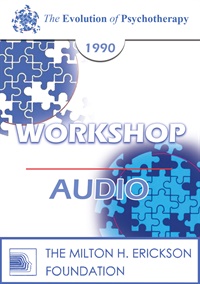
- Average Rating:
- Not yet rated
- Topic Areas:
- Workshops | Psychotherapy | Brief Therapy
- Categories:
- Evolution of Psychotherapy | Evolution of Psychotherapy 1990
- Faculty:
- Paul Watzlawick, PhD
- Duration:
- 2 Hours 23 Minutes
- Format:
- Audio Only
- Original Program Date:
- Dec 15, 1990
- Short Description:
- This workshop will present a brief therapy approach, based on the interaction between those involved in the problem, and on the interventions aimed at changing this problematic interaction by motivating the client(s) to behave "as if" the situation were different from the way it is perceived.
- Price:
- $15.00 - Base Price
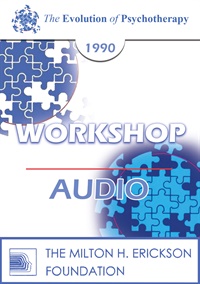
- Average Rating:
- Not yet rated
- Topic Areas:
- Workshops | Rational Emotive Behavior Therapy (REBT) | Psychotherapy | Relationships
- Categories:
- Evolution of Psychotherapy | Evolution of Psychotherapy 1990
- Faculty:
- Albert Ellis, PhD
- Duration:
- 2 Hours 31 Minutes
- Format:
- Audio Only
- Original Program Date:
- Dec 15, 1990
- Short Description:
- This workshop will present cognitive, experiential, and behavioral techniques for helping men and women to realize more of their human potential. There will be special emphasis on personal and work-related male/female relationships and on how to deal with negative reactions to "out of role'' behavior, such as women's assertiveness and men's expressions of intimacy. Live demonstrations will be offered.
- Price:
- $15.00 - Base Price
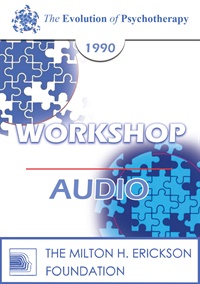
- Average Rating:
- Not yet rated
- Topic Areas:
- Workshops | Dreamwork | Sex and Sexuality | Couples Therapy | Psychotherapy
- Categories:
- Evolution of Psychotherapy | Evolution of Psychotherapy 1990
- Faculty:
- Helen Singer Kaplan, MD, PhD
- Duration:
- 1 Hour 42 Minutes
- Format:
- Audio Only
- Original Program Date:
- Dec 15, 1990
- Short Description:
- Two cases in which dream work played important roles will be presented and illustrated with videotaped sessions. The first is a case of a young single man with premature ejaculation, wherein the active, psychodynamic use of dream work "broke through'' the patient's intense resistance. The other is that of a married man with primary retarded ejaculations in which dreams were used to guide the behavioral aspects of therapy.
- Price:
- $15.00 - Base Price
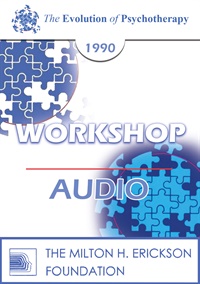
- Average Rating:
- Not yet rated
- Topic Areas:
- Workshops | Reality Therapy | Psychotherapy
- Categories:
- Evolution of Psychotherapy | Evolution of Psychotherapy 1990
- Faculty:
- William Glasser, MD
- Duration:
- 2 Hours 48 Minutes
- Format:
- Audio Only
- Original Program Date:
- Dec 15, 1990
- Short Description:
- Control theory, which is a new theory of how all living organisms function, will be explained. Discussion will show how this theory supports Reality Therapy and how Reality Therapy is enhanced by the knowledge of this theory.
- Price:
- $15.00 - Base Price
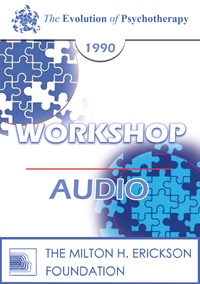
- Average Rating:
- Not yet rated
- Topic Areas:
- Workshops | Psychotherapy | Supervision
- Categories:
- Evolution of Psychotherapy | Evolution of Psychotherapy 1990
- Faculty:
- James Bugental, PhD
- Duration:
- 2 Hours 39 Minutes
- Format:
- Audio Only
- Original Program Date:
- Dec 15, 1990
- Short Description:
- Therapists learning depth psychotherapy (extending several years) make a greater personal commitment than in other forms of therapy. Supervision of this work requires attention to the therapist's subjective experience as well as to procedures and conceptual perspectives. This workshop will include direct teaching, unrehearsed demonstration with an actual supervisee, and candid feedback from supervisee and supervisor.
- Price:
- $15.00 - Base Price
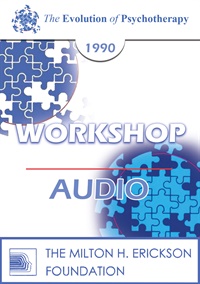
- Average Rating:
- Not yet rated
- Topic Areas:
- Workshops | Family Therapy | Psychotherapy
- Categories:
- Evolution of Psychotherapy | Evolution of Psychotherapy 1990
- Faculty:
- Salvador Minuchin, MD
- Duration:
- 1 Hour 36 Minutes
- Format:
- Audio Only
- Original Program Date:
- Dec 16, 1990
- Short Description:
- Workshop 31 from the Evolution of Psychotherapy 1990 - Family Therapy, featuring Salvador Minuchin, MD. This workshop will discuss the technique and theory of Family Therapy. Videotaped examples will be presented and discussed.
- Price:
- $15.00 - Base Price
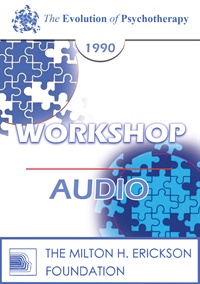
- Average Rating:
- Not yet rated
- Topic Areas:
- Workshops | Children and Adolescent Therapy | Family Therapy | Psychotherapy
- Categories:
- Evolution of Psychotherapy | Evolution of Psychotherapy 1990
- Faculty:
- Jay Haley, MA
- Duration:
- 1 Hour 28 Minutes
- Format:
- Audio Only
- Original Program Date:
- Dec 16, 1990
- Short Description:
- This workshop will center on a family-oriented approach to adolescent problems. Strategic therapy methods will be illustrated and discussed.
- Price:
- $15.00 - Base Price
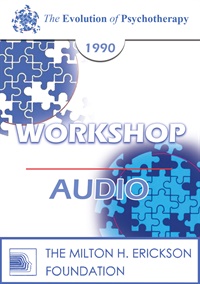
- Average Rating:
- Not yet rated
- Topic Areas:
- Workshops | Ericksonian Hypnosis and Therapy Techniques | Psychotherapy | Tailoring | Utilization | Indirection
- Categories:
- Evolution of Psychotherapy | Evolution of Psychotherapy 1990
- Faculty:
- Jeffrey Zeig, PhD
- Duration:
- 2 Hours 22 Minutes
- Format:
- Audio Only
- Original Program Date:
- Dec 16, 1990
- Short Description:
- Ericksonian approaches use both direct and indirect techniques and tailor methods to the unique characteristics of individual patients. Diagnostic categories can be used to individualize treatment. These tailored techniques are ways of "gift wrapping" ideas so that patients can best actuate effective changes. The concept of "Utilization'' and methods of processing interventions will be discussed. In Ericksonian treatment, dynamic experiences precede dynamic understanding.
- Price:
- $15.00 - Base Price
Please wait ...

